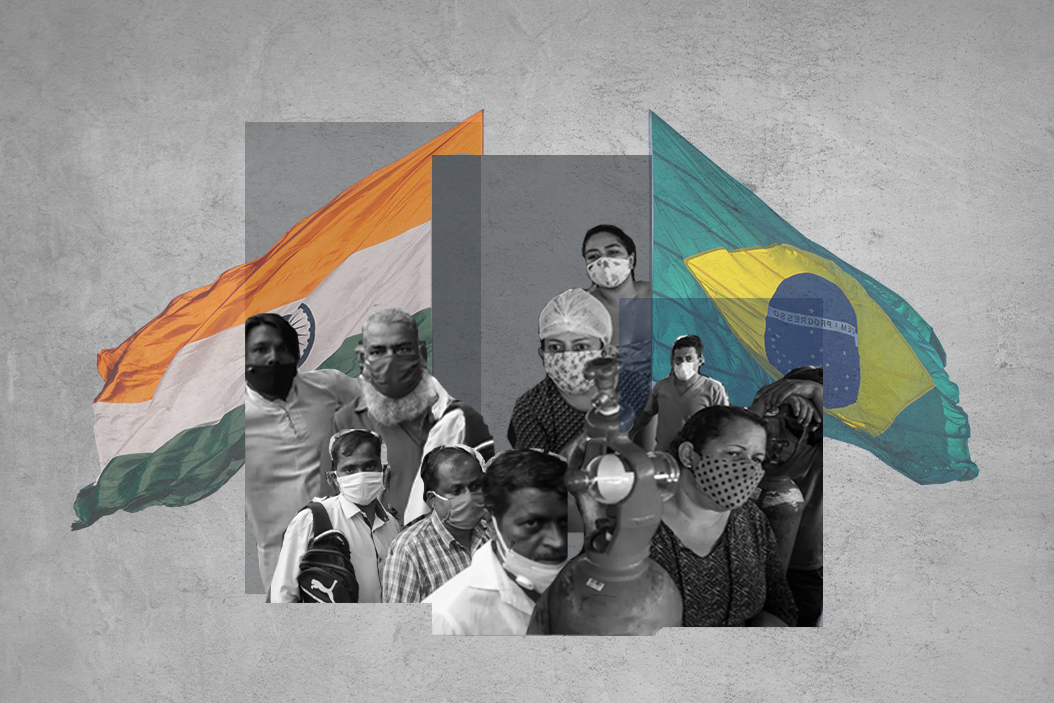May 05, 2021
While residents of wealthy countries are getting ready for hot vaxxed summer — COVID is still ravaging many low- and middle-income countries. The horrifying scenes coming out of India in recent weeks have gripped the world, causing governments and civil society to quickly mobilize and pledge support.
But on the other side of the globe, Brazil is also being pummeled by the pandemic — and has been for a year now. Yet thus far, the outpouring of aid and (solidarity) hasn't been as large.
What explains the global alarm at India's situation, and seeming passivity towards Brazil's plight? What are the politics of compassion?
Scope of the crises. Both India and Brazil are experiencing catastrophic outbreaks of disease. These countries have the two highest death rates in the world, recording 2,367 deaths (Brazil) and 3,571 (India) respectively on average over the past 7-days. (However, data coming out of India is vastly undercounted.)
Both are seeing a steady stream of new daily cases and deaths: Brazil and India recorded 28 new cases per 100,000 on average over the past week. But there's one big difference: while India's deterioration has been recent and swift, Brazil's crisis has been relentless over the past 12 months.
Global (in)action: While both Brazil and India are spiralling, the international response to India and Brazil has been vastly different.
For India, the Biden administration mobilized to deliver $100 million in emergency aid in mere days, and directed vaccine supplies to Indian drug manufacturers.
And while critics have pointed out that US aid to India is still too stingy, compare that to to Washington's tight-fisted approach to Brazil: despite repeated appeals for help from Brazilian officials, Washington has doled out just $19.7 million in pandemic-related aid over the past year, including less than $2 million for hard-hit Amazonian communities as they were literally fighting for breath. Similarly, Brussels has offered help to India, while remaining apathetic towards Brazil. (Germany recently sent 80 ventilators to the Amazonian city of Manaus.)
Why?
Politics is personal. One contributing factor is that Brazil's President Jair Bolsonaro has not cultivated much goodwill from the international community over the past few years. The brash populist has denied the severity of COVID, scuttled states' efforts to implement lockdowns, and sowed doubt about vaccines' efficacy. And his history of insulting world leaders hasn't helped: He amplified a social media post describing French President Emmanuel Macron's wife as "ugly," and questioned President Biden's electoral victory. Meanwhile, his own government has managed to insult Beijing (mocking Chinese-made vaccines and tweeting racist content about the origins of the pandemic) despite the fact that Brazil depends heavily on China — its largest trade partner — for vaccine supplies.
India's Prime Minister Narendra Modi, by contrast, has cut a different figure. Although he is a divisive leader who has made a series of recent blunders in handling the pandemic, he has not diminished the seriousness of COVID-19, and has maintained warm relations with governments whose help his country desperately needs. That approach appears to be working better than Bolsonaro's.
The power of the diaspora. At 18 million, India has the world's largest diaspora, 17 percent of whom live in the United States. As India's crisis spiraled, student groups and non-governmental organizations around the world quickly stepped in to raise funds. Indiaspora, a DC-based non-profit, announced that it had raised $1 million in just 48 hours. Meanwhile, GoFund said that 60,000 donors from 106 countries had contributed to India-related fundraisers since April 17.
While Brazil also has a sizable diaspora population, 450,000 of whom live in the US, its size pales next to India's. And there has been almost nothing comparable in terms of online fundraising.
Acute vs chronic disease. Since COVID exploded in December 2019, hotspots have come and gone. But Brazil's crisis has been more or less constant for a year now. COVID cases — and deaths — have continued to plague populous states like São Paulo and Minas Gerais. Many people around the world seem to have gotten used to things being very bad in Brazil.
India, on the other hand, seemed to have things under control as recently as March. The crisis appeared to come out of nowhere just as economies in Europe, North America and elsewhere were preparing to reopen. This created a sense of global panic and served as a call to action because no one is going back to normal until we all are.
At the moment, neither Brazil nor India is close to that.
From Your Site Articles
- Podcast: Journalist Barkha Dutt on India’s COVID calamity - GZERO Media ›
- How one Indian-American couple raised over $500k to send oxygen equipment to Delhi - GZERO Media ›
- Brazil on the brink ›
- How did COVID affect climate, US-China relationship? - GZERO Media ›
- India’s COVID calamity - GZERO Media ›
- Can Brazil (and Bolsonaro) recover from a crippling year? - GZERO Media ›
- Did “complacency” cause India’s COVID explosion? - GZERO Media ›
More For You
A photograph posted by U.S. President Donald Trump on his Truth Social account shows him sitting next to CIA Director John Ratcliffe as they watch the U.S. military operation in Venezuela from Trump's Mar a Lago resort, in Palm Beach, Florida, U.S., January 3, 2026.
@realDonaldTrump/Handout via REUTERS
Most Popular
- YouTube
In this "ask ian," Ian Bremmer analyzes Trump’s recent meeting with Zelensky and how close (or far) Russia and Ukraine are from a peace deal.
Syrian President Ahmed al-Sharaa attends the military parade of the Syrian army in Umayyad Square in central Damascus to mark the one-year anniversary of the fall of the Assad regime, on Dec. 8, 2025.
Mohammed Al-Rifai/dpa via Reuters Connect
A year ago this month, Syria’s brutal dictatorship collapsed. There are signs of recovery, but sectarian violence threatens to undermine the optimism.
© 2025 GZERO Media. All Rights Reserved | A Eurasia Group media company.
